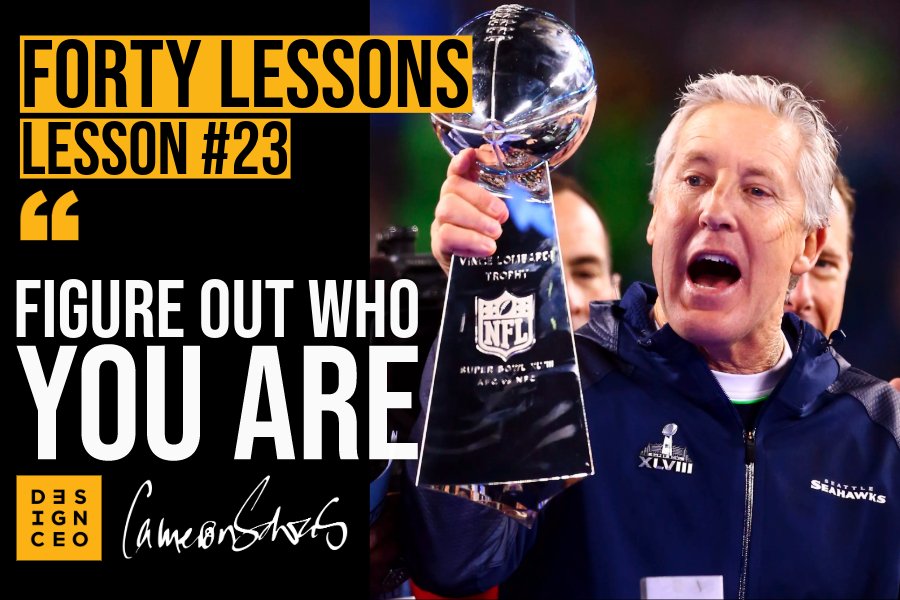Lesson #23 - Figure out who you are
I remember hearing an old footy coach refer to feedback as the ‘Breakfast of Champions’. For what seems like forever, wisdom passed from one generation to the next; breakfast is not something to be forsaken in the rush to be somewhere else; it is, in fact, the most important meal of the day.
But even this wisdom, never questioned, is up for grabs, with many proponents of fasting repealing their grandparent’s advice and giving breakfast a miss.
For leaders serious about leadership and creating the conditions to enable a group to perform at its best, I channel the old footy coach; giving feedback a miss is not an option.
Ensuring you receive feedback, well, that is a different challenge.
Like breakfast, feedback comes in many forms.
It could be ‘Coco-Pops’, a sugar hit so obvious that thinking otherwise is foolhardy.
Then there is the ‘Nutri-Grain’ feedback, presenting itself as something other than what it is, Coco-Pops in disguise that will only dupe the self-deluded.
Then there are the shelves of cereals that seem so well intended. They appear so wholesome, containing lots of goodness, nutritional merit, and the promise of a long-term relationship. But we later learned they contain ingredients that cereals of this kind shouldn’t, but you have to read the fine print to know they are there. “No wonder you tasted so good”, you say to yourself, but still not sure you are prepared to break the association.
When given access to new information, the leader’s capacity to absorb, recognise, value, ingest and apply is one of the tests we face.
Some leaders fully engage with leadership and its expectations to the extent that when it reveals who they are, from feedback in its many forms, they work hard to find the best parts of themselves while having the self-awareness that this is not what people get to experience all of the time, as well intended as you hope and believe it is.
Then there are others, considered successful by most measurements, who seem to ‘resist’ discovering that they still have much to learn, even having this expectation of others but not of themselves.
One reason, I suspect, is that as they climbed the ‘success ladder’, the less feedback and formal development they sought or received. But then, when seeking to transform organisational performance, they fail to recognise the personal transformation they need to undertake to lead this process, particularly when it comes to deeper change, such as cultural transformation, stuck in old-way thinking when every indicator points to a new-way expectation. They are ill-equipped for this challenge, unlikely to know why, and less likely to see themselves as the problem.
I know this because, as the leader, with the kind of introspection this form of insight requires, there were important times when I was the problem.
I have learned that whilst telling yourself a positive story offers no guarantees of success, consistently telling yourself a negative one will significantly diminish the prospect of it occurring. If you tell yourself a story often enough, you will end up believing it, good and bad.
Having wise people in your life, those who offer insight (wisdom), with integrity (character), who take the conversation seriously, but themselves less so, is one of the recommendations I make to leaders, given the embedded loneliness of leadership roles, and the challenges of creating frank exchanges within their organisation.
Accessing such wise people from a distance, people you will never get to meet or have one of those conversations with, provides some fertile ground for your own practice of reflection. You can see part of yourself in the story of those generous enough to share theirs and the growth that came from it.
I have been an admirer of NFL Coach Pete Carroll for many years.
When listening to Pete Carroll speak about leadership, you sense you are receiving the entire experience. Yes, he has been successful in all the ways that elite team sport measures success, in his case, Super Bowl Victories as a Head and Assistant Coach, Pac-10 College Championships, and up until recently, still coaching at the highest level into his 70s.
My admiration stems from his preparedness to share the lessons elite team sport will always deliver, with generosity and no ill feeling, blame or anger, often from the failures and losses, his darkest moments, when he, at his own admission, was the problem.
I have tried to take a leaf out of his book. As I have said previously, I have little to offer you if not for the mistakes and failures. I describe this as the ‘leader’s limp’, the inevitable condition that leaders will develop if they are prepared to invest themselves fully in the expectations of the role.
Failure is a bruise, not a tattoo.
“Never trust a leader without a limp” is a line I use often, and I enjoy leaders such as Pete Carroll who have the courage to be authentic, to speak about his limp, which the role will ask of you, and leave you with a choice, understanding there is no authenticity without vulnerability, and no vulnerability without bravery.
I use some of his thinking and frameworks in my work with leaders, particularly when they are facing the more complex and ambiguous moments, which is when we need leadership most.
An example is the simple yet demanding question he would ask of his team every year:
“If it was really good, what would it be like?”
I value his wisdom because it is clear he has ‘done the work’ as his friend, high-performance psychologist Dr Michael Gervais, puts it. The two worked closely together at the Seattle Seahawks when they won a Superbowl and then suffered a storied loss in the last play of the same game the following year, losing to the New England Patriots, which put an enormous spotlight on Pete Carroll and his decision-making, now embedded in the folklore of the game. People are still talking about a decade later and will forever.
For Carroll, whilst fully appreciating the stakes were at their highest, it was just another lesson and could only ever be that. With a mindset of ‘we win, or we learn, and learning is winning’, he got on with what was expected of him.
Learn the lesson. Lead his team.
Yes, he has ‘done the work’ but continues to ‘do the work’.
Two weeks ago, it was announced Pete Carroll would no longer be coaching the Seattle Seahawks. The above video was part of his press conference after his sacking was announced and showed him with all his dignity, generosity, and selflessness.
When asked a question about the next coach of the team he had led for the previous fourteen years, the most successful run in the team’s history, and having only recently learned of a life-changing decision made for him, and not by him, no longer doing the thing he loved and had done so well, he answered with the mindset that has become his trademark.
His presence in that moment, and leadership is measured in moments, is symbolic of the leader he has become. He understood that while this was his press conference, he now represented the past, and the club needed to have a future. His capacity to access and articulate with such clarity is evidence of the work he has done and has begun doing. He is being the example of the very message he is now speaking to.
“It wouldn’t matter if it was football or whatever; the essence of being as good as you can be is to figure out who you are.”
“A relentless effort to try and get clear on what is important to you, what uncompromising principles do you stand by, what makes you who you are; if you don’t go through that process of self-discovery, you don’t have an opportunity to be your best because you do not know who you are yet.
Understand what kind of player you are, what kind of coach you are, what kind of person, what kind of father you are, all the way down the line, maximise your authenticity, connected to that true essence of who you are, that’s what is crucial. Without that, you are going to be sometimes, you’re gonna be sometimes…it is hard to be consistently successful because people don’t understand how they got there.”
Link to the full Press Conference – Lots of gems
My goal in writing these stories is to not only build on the lessons of the game, mostly wonderful but often harsh and unforgiving in ways that I questioned my capacity to withstand, but to share the wisdom, gratitude and love I have for those who trusted me enough to share the best of themselves. I got to benefit from their bruises, as I hope you will from mine.
In this moment, Pete Carroll, when feeling bruised, gave the best of himself and gifted us the benefit of his bruising.
When you understand what truly matters, you get to enjoy what seems to matter.
There are a lot of ‘seems to matter’ moments in sport.
Then there are the ‘truly matters’ moments.
Such as this.
Play on!
Stay Connected
Please subscribe to our “In the Arena” email.
From time to time to time we will email you with some leadership insights, as well as links to cool stuff that we’ve come across.
We will treat your information with respect and not take this privilege for granted.



